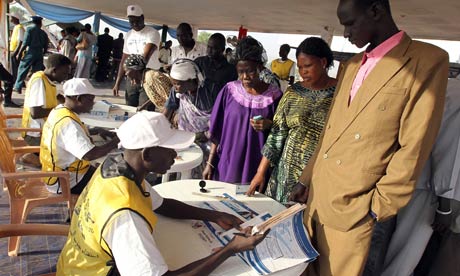By Daniel M. Austin
Impunity Watch Reporter, Africa

ALGIERS, Algeria – On Saturday, February 12, thousands of Algerian police officers in riot gear clogged the streets of the capital to prevent pro-democracy demonstrators from marching on the city’s main square. The protesters, inspired by events that have taken place in Egypt and Tunisia are demanding significant government reforms. During clashes with Algerian security forces several hundred protesters were arrested or detained. As of Saturday evening, police officers were still patrolling the streets and dozens of armored police vehicles had sealed off the city’s main square.
Demonstrators gathered in May First Square in central Algiers shouting for President Abdelaziz Bouteflika to leave office. The demonstrators were contained by a large contingent of police officers armed with truncheons. Reports vary on the number of protestors involved in the demonstration from several hundred to several thousand. One observer claimed that the government had mobilized 30,000 police officers as a show of force to ensure any popular revolt would be stomped out. Along with the demonstration in Algiers, protest marches also took in other cities throughout Algeria including Annaba, Constantine and Oran.
The demands of protesters in Algeria are similar to what was asked for in Tunisia and Egypt. Specifically, the demonstrators want President Bouteflika to leave office, an end to the State of Emergency that has been in place for more than 19 years, and democratic elections.
The government of President Bouteflika has been attempting to break this popular uprising using tactics similar to what was seen in Egypt. In particular, aggressive police tactics and violence against protesters as well as journalist have been reported. Protestors claim as many as 500 people have been arrested in the capital city alone. Further, several hundred demonstrators were detained in other cities throughout the country. Additionally, the government has limited or shut down access to the internet including Facebook attempting to limit the protester’s ability to organize using social media.
Similar to Egypt, Algeria suffers from high unemployment, rising food prices, a lack of housing and disconnect financially and socially between the average Algerian and the class of people who rule the country. Political corruption and poverty are rampant in this North Africa nation even though Algeria has oil resources and holds the eighth largest supply of natural gas in the world.
For more information, please see:
Al Jazeera — Algeria protesters push for change – 12 February 2011
Bloomberg — Algeria Detains 100 Protesters During Algiers Sit-In – 12 February 2011
New York Times – Security Forces Halt Protest in Algeria – 12 February 2011
Reuters — Algeria police stifle Egypt-inspired protest — 12 February 2011
The Telegraph—Algeria Shuts Down internet and Facebook as Protest Mount – 12 February 2011


